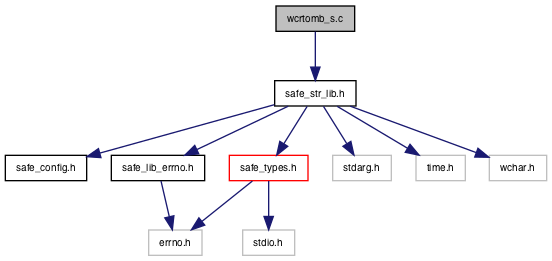#include "safe_str_lib.h" Include dependency graph for wcrtomb_s.c:
Include dependency graph for wcrtomb_s.c:Functions | |
| EXPORT errno_t | wcrtomb_s (size_t *restrict retval, char *restrict dest, rsize_t dmax, wchar_t wc, mbstate_t *restrict ps) |
Does not permit the ps parameter (the pointer to the conversion state) to be a null pointer. More... | |
Function Documentation
◆ wcrtomb_s()
| EXPORT errno_t wcrtomb_s | ( | size_t *restrict | retval, |
| char *restrict | dest, | ||
| rsize_t | dmax, | ||
| wchar_t | wc, | ||
| mbstate_t *restrict | ps | ||
| ) |
Does not permit the ps parameter (the pointer to the conversion state) to be a null pointer.
The restartable wcrtomb_s function converts a single wide character to its narrow multibyte representation from the current LC_CTYPE locale that begins in the conversion state described by *ps. If dest is not null, the converted multibyte characters are stored in dest. Max. MB_CUR_MAX will be written to dest.
If dest is a null pointer, the call is equivalent to wcrtomb_s(&retval, buf, sizeof buf, L'\0', ps) with internal variables retval and buf (whose size is greater than MB_CUR_MAX).
If wc is the null wide character L'\0', a null byte is stored, preceded by any shift sequence necessary to restore the initial shift state and the conversion state parameter *ps is updated to represent the initial shift state.
If the environment macro STDC_ISO_10646 is defined, the values of type wchar_t are the same as the short identifiers of the characters in the Unicode required set (typically UTF-32 encoding); otherwise, it is implementation-defined. In any case, the multibyte character encoding used by this function is specified by the currently active C locale.
If the environment macro STDC_MB_MIGHT_NEQ_WC is defined, then for members of the basic character set multibyte-character encoding might not equal wide-character encoding (non-ASCII-based systems, such as EBCDIC-based systems, may use Unicode for their wide character encoding and still be conforming). ASCII-based systems with STDC_ISO_10646 defined leave STDC_MB_MIGHT_NEQ_WC undefined.
With SAFECLIB_STR_NULL_SLACK defined all elements following the terminating null character (if any) written in the array of dmax characters pointed to by dest are nulled.
- Remarks
- SPECIFIED IN
- C11 standard (ISO/IEC 9899:2011): K.3.9.3.1.1 The wcrtomb_s function (p: 647-648) http://en.cppreference.com/w/c/string/wide/wcrtomb
- ISO/IEC TR 24731, Programming languages, environments and system software interfaces, Extensions to the C Library, Part I: Bounds-checking interfaces
- Parameters
-
[out] retval pointer to a size_tobject where the result will be stored[out] dest pointer to bytes where the result will be stored [in] dmax restricted maximum length of dest[in] wc the wide character to convert [in] ps pointer to the conversion state object
- Precondition
- retval and ps shall not be a null pointer.
-
dmax shall not be greater than
RSIZE_MAX_STR(unless dest is null). - dmax shall not equal zero (unless dest is null).
- dmax must be zero if dest is null.
- Note
- C11 uses RSIZE_MAX, not RSIZE_MAX_STR.
- Returns
- Returns zero on success and non-zero on failure, in which case,
dest[0] is set to '\0' (unless dest is null or dmax is zero or greater than RSIZE_MAX_STR) and*retvalis set to (size_t)-1 (unless retval is null).
- Return values
-
EOK on successful conversion. ESNULLP when retval or ps are a NULL pointer ESZEROL when dmax = 0, unless dest is NULL ESLEMAX when dmax > RSIZE_MAX_STR, unless dest is NULL ESNOSPC when dmax is smaller than the number of required bytes
- See also
- wctomb_s()
